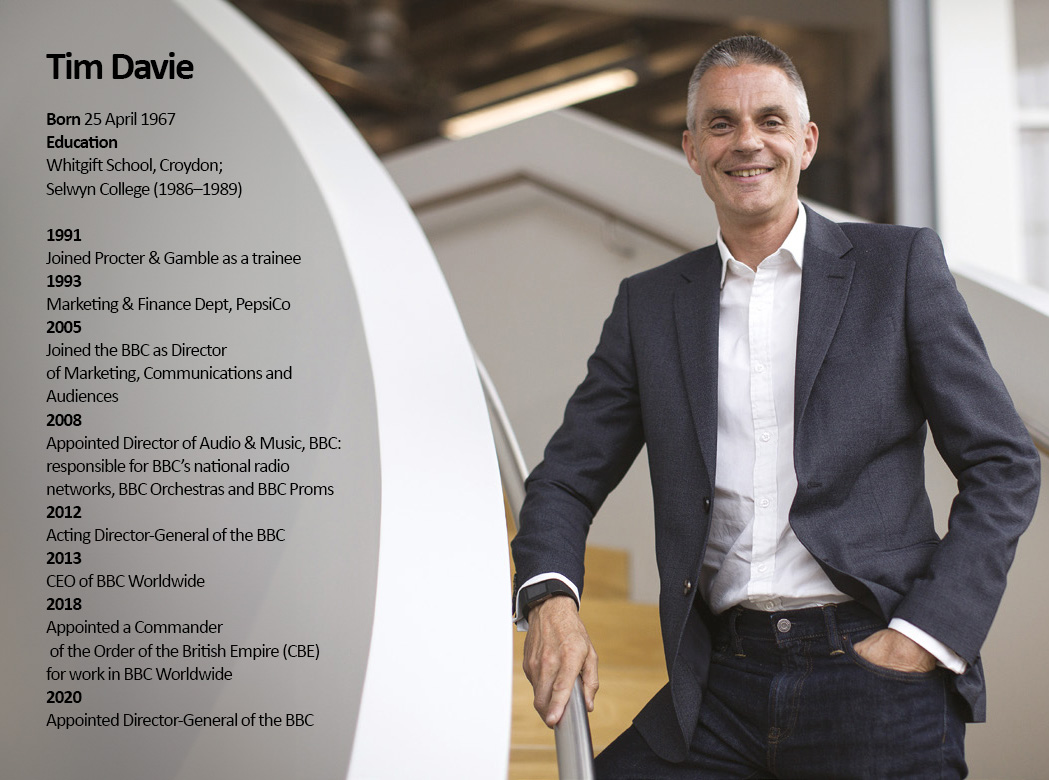In the UK, the hottest seat in broadcasting is director-general of the BBC. The corporation remains the strongest force in British media, with over 90% of the public consuming its content each week. It has hundreds of millions more in its worldwide audience. And yet it is always near the centre of controversy about its funding, its programmes and its politics. Tim Davie (SE 1986) sets out the case for the organisation he leads.

In the past few years, a new wave of technological change has rapidly reshaped our media landscape. It has brought with it huge benefits to consumers, with more choice than ever before, and exciting new opportunities in areas such as AI. It is amazing to think that during my time at Selwyn we had no mobile phones, no social media and only four TV channels!
But the new world brings fresh challenges too. The challenge to our democracy from disinformation and malign international influence is growing. Over 70% of the world does not even have a free press. And there is the challenge to our society from media fragmentation, polarisation and social division. Earlier this year, I set out ‘A BBC for the Future’. It is a plan for how we intend to focus our mission and resources more closely on the needs of today’s society, and respond more directly to some of the shared challenges we now face.
It prioritises three clear roles for the BBC in the years ahead. To pursue truth with no agenda, by reporting fearlessly and fairly. To back the best British storytelling, by investing in homegrown talent and creativity. And to bring people together, by connecting everyone across divides.
I could focus on any one of these here, and institutions like Cambridge are important partners in nurturing a stronger, enlightened society. But I sometimes think that in this country we take our creative success and global cultural influence for granted. It is worth reminding ourselves of exactly what is at stake.
The UK’s creative industries are a growing £125 billion success story. They are built on a unique, globally-admired system of public and commercial investment that has proven itself over decades in delivering profits for both society and the UK balance sheet. They are much more than ‘soft’ power.
But in a competitive global market, the pressure on huge international businesses to deliver efficiency creates genuine jeopardy for UK-originated content and homegrown storytelling.
Authentic British stories, brilliantly and beautifully told, are our unique point of difference in a saturated market that has become hung up on the abstract notion of global appeal.
Tim Davie
These are the stories that celebrate and showcase our world-leading culture and creativity. They document the differences that make each of our nations and communities special – think Blue Lights, Sherwood or Happy Valley. Most importantly, they are the stories that British audiences value the most. In 2023, of the two top ten most viewed programmes, 100% were UK stories or events, with 70% from the BBC.
And beyond these shores, it is the strength of our local storytelling that is the key to our international creative success. Authentic British stories, brilliantly and beautifully told, are our unique point of difference in a saturated market that has become hung up on the abstract notion of global appeal.
This storytelling is deep in our DNA and is directly linked to my privileged days at Selwyn reading the very best of English literature from the last seven centuries.
On the global streaming services, a small minority of the offer is UK content. This is not a criticism – they are impressive companies that make many good shows. But there is no doubt that global economic models drive you to a different place, editorially, to a UK player.
Today the BBC invests far more in original British content than anyone else. No one does more to champion new talent from every part of the UK. Without us – without the public service broadcasters – the scale and scope of that spending on British stories would quite simply not be replaced.
The result of all this is that the BBC represents a powerful growth and innovation fund for the UK. We contribute almost £5 billion to the UK economy each year, supporting over 50,000 jobs and working with 14,000 suppliers. Every £1 of our direct economic activity generates £2.63 in the economy as a whole. And 50% of our economic impact is outside London, compared to an industry average of 20%.
Together we need to champion institutions like the BBC and make sure that the UK’s remarkable creative success story continues. That is why we are doubling down on our commitment to back the best British storytelling in the years ahead. Not only for the benefit of our audiences, but to safeguard the strength of the UK’s creative sector as a whole.


